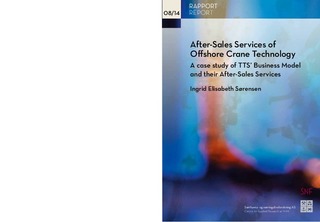After-sales services of offshore crane technology : a case study of TTS’ business model and their after-sales services
Abstract
This master’s thesis is a case study concerning after-sales services in the offshore crane industry. The case in question looks at the different service models that TTS Group ASA offers their customers. This company has recently developed a new service model and initiated a pilot project with one of their customers.
TTS is a global supplier company with a strong position in the offshore market that over the last couple of years has increased its focus on service. Due to high complexity within offshore equipment, customers have become more dependent on suppliers. They require more service from them, and the new service model is believed to improve service of the offshore cranes. This model will provide the customer with two service engineers from TTS that will operate as crane operators and become part of the crew on board the vessel.
The theory related to this study is literature concerning the concepts of business models in terms of value creation, value delivery and value capture. This literature was used as a backdrop for discovering concepts for further study in the research. The Transaction Cost Economics is used to analyse which governance structure will be most suitable for the new service model. The empirical data was collected through interviews with employees vital to the pilot project both at TTS and at GC Rieber. TTS’ websites and publications, as well as written documentation provided by TTS, supported the data collected through interviews.
Findings of the study are related to the characteristics of the current business model, as well as the expectations and challenges of the new service model. Important factors for the new service model are increasing the reliability of the offshore crane, and ideally preventing downtime, as well as profiting from the competence and skills of their employees. The new service model requires greater cooperation between supplier and customer, than previous models. This cooperation can cause frictions if the roles and responsibilities from each party is not clarified. In addition, TTS needs to provide potential customers with a proper measurement for potential cost savings in order to attract customers to the model. A collaboration in the form of a joint venture is therefore recommended, in order to secure both parties from potential opportunistic behaviour and increase the total value creation.
